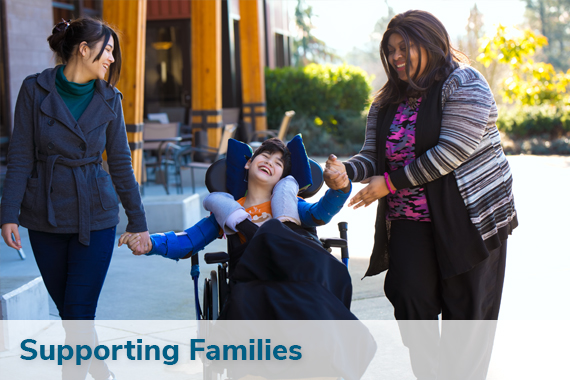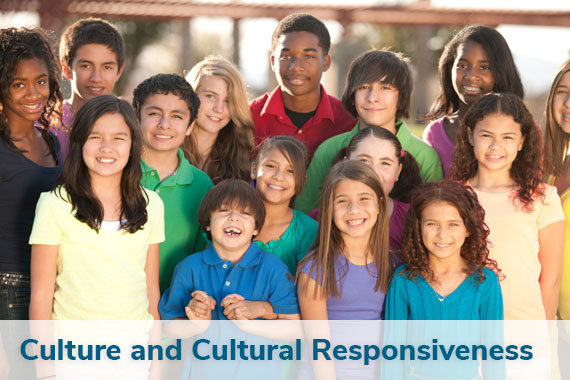These free online resources may be helpful to CSAs. Resources include e-learning modules, webinars, videos, and other helpful documents relevant to working with children and families. Resources are categorized into topic areas to help you find supportive materials easily. These resources may also benefit ACOs and CPs.
The statements in these resources are made solely by the organizations that developed them. No statement in any resource should be construed as an official position of or endorsement by Abt Associates or the Massachusetts Executive Office of Health and Human Services.
What is Intensive Care Coordination? (10 Min.)
Developed by MassHealth to educate families and other referral sources, this video features an experienced Care Coordinator and Family Partner describing the service and the role each plays in supporting families. It can be a useful resource for onboarding new CSA staff or as a pre-interview activity for prospective staff.
University of Maryland Institute for Innovations and Implementation—Wraparound Trainings
The Institute for Innovations and Implementation offers four free, e-learning trainings related to Wraparound and healthcare. They can be found by visiting the homepage, and then selecting Trainings and Online Trainings. The Wraparound section is found toward the end of list. Each of these trainings has a pre-test and post-test and some offer a certificate of completion. You will be prompted to create a user I.D. and password to access the trainings. Please note that the trainings use Adobe Presenter and are best viewed through Internet Explorer, Microsoft Edge, or Mozilla Firefox.
- Introduction to Wraparound: Brief Overview (40 Min.)
Wraparound practitioners in Massachusetts will notice some differences in language as the examples cited in this module are from Maryland and Milwaukee (for instance, in Massachusetts we refer to the Wraparound principle of Persistence, while the University of Maryland Wraparound overview calls it Unconditional Care). That said, the basic philosophy and values of Wraparound presented within this training are consistent, regardless of state or jurisdiction.
- Somatic Healthcare for Children and Adolescents (4 modules, each approximately 40 Min.)
Modules cover Infancy, Early Childhood, Middle Childhood, and Adolescence. Each provides an overview of what happens during pediatric primary care well child visits and addresses topics such as developmental milestones, immunizations, asthma, obesity, sexually transmitted infections, and other acute conditions.
- Oral Healthcare for Children and Adolescents (15 Min.)
Provides an overview of oral health and how it contributes to overall physical health and quality of life children and adolescents.
- Systems of Care Overview (2 Hours)
Most appropriate for new Program Directors. Provides a primer for understanding the principles of the Systems of Care approach and the current state of child-serving systems, as well as the seminal document, Systems of Care by Sheila Pires.
What is Wraparound? (4 Min.)
Produced by the SAMHSA TA Network (National Training and Technical Assistance Center for Child, Youth, and Family Mental Health) this video provides a high-level illustration of how Wraparound works as a collaborative-care approach that supports behavioral health reform efforts at the state, local, and program levels. It’s also a great way to introduce Wraparound to potential care plan team (CPT) members and system partners unfamiliar with this approach.
National Wraparound Initiative
National Wraparound Initiative works to promote understanding about the components and benefits of care coordination using the Wraparound practice model, and to provide the field with resources and guidance that facilitate high quality and consistent Wraparound implementation.
National Wraparound Implementation Center
NWIC supports states, communities, and organizations to implement Wraparound effectively through training and workforce development, organizational- and system-level technical assistance, and evaluation support.
Wraparound – An Introduction for Families and Team Members (4 Min.)
This short animated video offers a general introduction to Wraparound for children, families and others who may be learning about it for the first time. It describes why this care coordination process was created, and how its team approach helps children and youth who experience serious mental health or behavioral challenges, and their families. This can be a helpful tool as you engage families and other team members new to the Wraparound process.


Ontario Centre of Excellence: What is Family Engagement? (5 Min.)
This video describes meaningful engagement with families and how it can lead to more effective care planning for children with mental health needs. This may be useful as an introduction to this core value for new CSA staff, a refresher for seasoned staff, or group supervision or staff meeting facilitated discussions on engagement.
ParentingWell
The majority of adults with lived experience of mental illness are parents. (68% of women are mothers, and 55% of men are fathers). This is true across categories of mental health diagnoses, including adults with serious and chronic mental illness. ParentingWell® is an approach to routine practice that makes talking about parenting, children, and family experiences a natural part of the conversation about an adult’s recovery process. Recovery does not occur in isolation. Family can provide motivation for change. Family members can encourage and support individuals to seek help. Parenting provides opportunities to be part of a community—in the neighborhood or through participation at children’s school events, for example. ParentingWell promotes a parent’s ability to live interdependently and to pursue recovery in the context of family life. While this work was developed for providers working with adults, it may be useful for family engagement work in Wraparound. Visit the Children’s Behavioral Health Knowledge Center website to learn more.
Coordinating Care in Outpatient Therapy
MassHealth and the Children’s Behavioral Health Knowledge Center at DMH developed this free, interactive training for outpatient therapists to explain reimbursement changes for care coordination—as of October 2016 MassHealth began reimbursing collateral contacts and case and family consults at the same pro-rated amount as a 60 minute office visit. This training is also great introduction to how MassHealth hub services for children and youth work. This is a useful educational resource to share with system partners, for instance, an outpatient therapist on your care planning team (CPT).
Building Effective Partnerships with Psychiatric Partners Webinar (1 Hour)
Developed by the Children’s Behavioral Health (CBH) Knowledge Center at the Massachusetts Department of Mental Health, this webinar offers techniques for psychiatric prescribers and families who have children that are on or are candidates for psychotropic medication to work collaboratively.
Boston Children’s Hospital Neighborhood Partnerships (BCHNP) Online Trainings
BCHNP is the community behavioral health program in the Department of Psychiatry at Boston Children’s Hospital. Through the Training and Access Project, BCHNP provides online courses on behavioral health and schools. Courses are developed for school personnel, however the trainings may be of interest to anyone interested in the social-emotional development of school-age children and behavioral health. New and seasoned CSA staff can learn more about school culture and prepare them for more effective collaboration and communication with partners in the school system, as they relate to individual care plans with families. The trainings are hosted on the Open Pediatrics learning platform where you must create a profile and take an initial survey about your role to explore trainings.
Systems of Care Overview (2 Hours)
Federation for Children with Special Needs—Parent Consultant Training Institute (PCTI) Resource Page
The Federation for Children with Special Needs (FCSN) provides information, support, and assistance to parents of children with disabilities, their professional partners, and their communities. FCSN offers a rich catalog of webinars, slide decks, and fact sheets related to special education for caregivers and professionals who work with families involved with special education. Some resources are available in Spanish, Portuguese, and Haitian Creole. There is a schedule of workshop topics where you can also learn how to request a workshop.
Following is a sampling of resources that will help new CSA staff gain foundational knowledge of special education so that they can support caregivers’ self-advocacy in the school system.


Improving Cultural Competency for Behavioral Health Professionals
The US Department of Health and Human Services (HHS) Office of Minority Health offers this free accredited e-learning program for behavioral health providers to help develop knowledge and skills related to culturally and linguistically appropriate services.
Combatting Mental Health Stigma in the African American Community (5 Min.)
Developed by the MGH Clay Center for Healthy Young Minds (www.mghclaycenter.org), this video is useful for Care Coordinators and Family Partners at all levels. It describes the stigma of seeking mental health treatment and explains why people of color may not feel comfortable seeking help, especially from providers who are white. The video can be used as a training tool to stimulate discussions on cultural differences between providers and clients.
Cultural Competence E-Learning Series
The Hospital for Sick Children in Toronto (Sick Kids) developed 15 open access interactive e-learning modules. The modules reference physical health/medical settings (i.e “patients”, “patient safety”), but the concepts and content are relevant to new and seasoned CSA staff working with families with diverse cultural backgrounds. The following modules are particularly relevant to CSA staff:
- Introduction to Clinical Cultural Competence
- Social Determinants of Health
- Cross Cultural Communication
- Parenting Across Cultures
- Mental Health and Cultural Competence
- Cultural Competence in Social Work-A Case Study Approach
The 12 Core Concepts for Understanding Traumatic Stress Responses in Children and Families (1 Hour)
The National Child Traumatic Stress Network (NTCSN) offers several trainings and resources as part of the Core Curriculum on Childhood Trauma to promote a trauma-informed mental health workforce. The 12 Core Concepts for Understanding Traumatic Stress Responses in Children and Families contains interactive online lessons that lead you through each of the 12 Core Concepts of traumatic stress. This training would be useful for new and seasoned CSA staff as they develop their trauma lens in order to better serve children and families.
Trauma Learning Policy Initiative (TLPI)
TLPI advocates for trauma-informed schools through research and reporting and provides support to schools creating trauma-sensitive environments. While the resources TLPI develops are intended for educators and other school based personnel, the content is relevant to new and seasoned CSA staff as many families’ individual care plans include goals related to school and education. CSA staff may also find it useful to share these resources with schools they work with to build an understanding around trauma and how it may impact behavior. New TLPI resources are featured in blogs.
How Prevalent is Traumatic Experience? (7 Min.)
This video is a brief overview of Adverse Childhood Experiences (ACEs) and their connection to later social, emotional/behavioral, physical health issues in affected individuals.


Mental Health: Self Care
Developed by the Johns Hopkins Center for Public Health Preparedness, this online module for mental health professionals describes how stress can impact work and offers suggested coping strategies. Concepts will be useful to new CSA staff who may find themselves working with families affected by complex trauma and stress.
The Headington Institute
Through its support of humanitarian and emergency/disaster response workers, the Headington Institute has many resources that are very relevant to new and seasoned CSA staff on topics such as stress and burnout, resilience, and self-care. The resource page hosts several handouts, including self-assessments on such topics as job stress and burnout. The Headington Institute also offers e-learning courses for a small fee.
